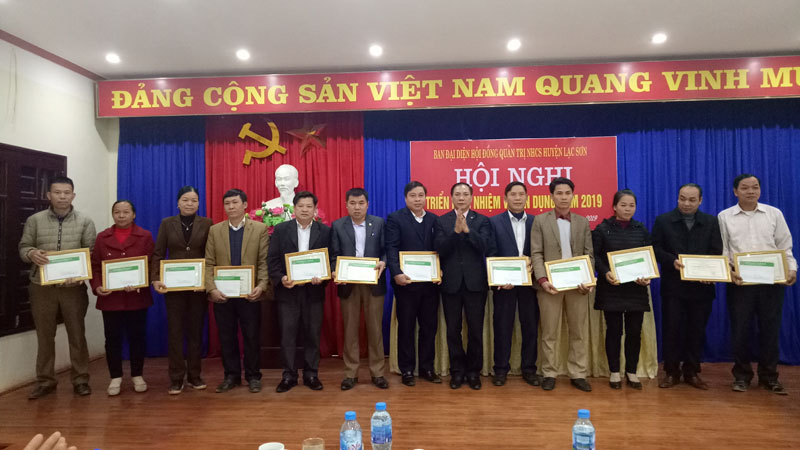
(HBO) – The Representative Committee of the Board of Directors of the Vietnam Bank of Social Policy (VBSP) branch in Lac Son district held a conference to review credit activities in 2018 and launch tasks for 2019.
In 2018, outstanding loans under the branch’s 15
credit programmes in the district totalled 388.13 billion VND (16.73 million
USD), up 25.43 billion VND from the start of the year.

Leaders
of the VBSP provincial chapter present reward to 12 communes posting no overdue
debts in 2018.
The bank had a total of 18,115 customers in
the district, who were members of 492 saving and borrowing groups. On average,
each commune or town has 17 operating groups, with an average membership of 37 and
average outstanding loans worth 787 million VND each.
Twelve out of 29 communes and towns in Lac Son,
or 41.38 percent, recorded no overdue debts. As many as 402 groups received good
ratings, while 88 others gained fair ratings and two groups ranked average,
with no underperforming groups.
Social policy credit has provided financial
resources for more than 18,000 households living below or just above the
poverty line along with beneficiaries of the State’s preferential policy to
develop household production or business, thereby creating new jobs and
ensuring social welfare.
At the event, the VBSP branch in Lac Son
district outlined nine key tasks for 2019.
On the occasion, the bank’s provincial branch presented
rewards to 12 communes recording no overdue debts in 2018. Meanwhile, the
People’s Committee of the district handed over rewards to 11 collectives and 13
individuals with outstanding performance in social policy credit in 2018./.
Hoa Binh province is undergoing a dynamic transformation amid Vietnam’s national digital transition. Building on Poliburo’s Resolution No. 57-NQ/TW on breakthroughs in science, technology, innovation, and national digital transformation, the province has rolled out a wide range of practical action plans. A standout initiative is the "Digital Literacy for All” movement, an effort to ensure that no one is left behind in the digital era.
Hoa Binh province is undergoing a dynamic transformation in the wake of the national digital transformation movement. Building on Resolution No. 57-NQ/TW of the Politburo on breakthroughs in science, technology, innovation, and national digital transformation, the province has implemented a wide range of practical action plans. A standout initiative is the "Digital Literacy for All” movement ambitious effort to ensure that no one is left behind in the digital age.
With a spirit of unity and proactive problem-solving, the Party Committee, the government and the people of Dong Lai Commune (Tan Lac District) have made great strides in implementing the resolutions of the 24th Party Congress of the commune for the 2020 - 2025 term. Focusing on leadership and practical actions, the commune has brought the Party’s resolutions into daily life, creating strong impacts and pushing the local development forward.
Amid the nationwide push for digital transformation, young people in Hoa Binh Province are stepping up as dynamic pioneers, applying technology to enhance Youth Union operations and expand the reach of youth-led initiatives. Through creativity and adaptability, Youth Union organizations at all levels have introduced a series of practical solutions, contributing to modern governance and community development.
In recent years, An Nghia commune, located in Lac Son district, has stepped up administrative reform, focusing on improving the quality and efficiency of its single-window service unit for receiving and processing administrative procedures. These improvements have helped create favourable conditions for local residents and organisations to handle administrative procedures, contributing to the commune’s broader socio-economic development.
The Prime Minister-approved master plan to develop the multi-use value of forests ecosystems through 2030, with a vision to 2050, aims to improve the management and sustainable use of forest resources, create jobs, increase incomes, and improve the living standards of ethnic minorities, people in mountainous and remote areas, forest workers and those living near forests.



